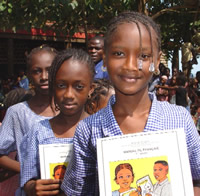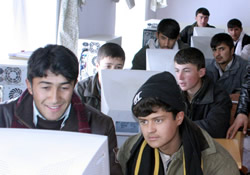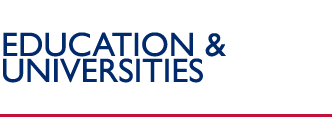Education & Universities
 |
| Schoolgirls in Guinea receive textbooks donated by USAID. To supplement textbooks, USAID supports a scholarship program for young girls and helped train primary school teachers to improve the quality of classroom instruction. |
Literacy - the ability to read and write - is a basic skill for people to live and work in today’s world. Yet more than 700 million adults are not literate, primarily in developing countries. About 72 million children who should be in school are not. For this reason, USAID assists developing countries to improve pre-primary, primary, and secondary levels of education. Teacher training for these levels, as well as adult literacy programs, are important elements of USAID’s education initiatives. Special emphasis is placed on improving educational opportunities for girls, women and other under served and disadvantaged populations.
Competitive economies require workers to be able to learn advanced and changing concepts of science and technology, law and governance, and business and on a continuous basis. Without sound conceptual and technical skills acquired in secondary schools, workforce development programs, community colleges, and universities, youth in developing countries will be unable to be as productive and as innovative as they could – and should be. Therefore, in collaboration with American universities and colleges, USAID supports a wide variety of training, workforce development, and higher education programs that strengthen faculties and administrations in both developing countries and the United States.
 |
| Students at the Badakshan Institute of Technology in Afghanistan learn skills for jobs they hope to find as Afghanistan develops. |
In addition, USAID provides both long and short-term training opportunities to hundreds of thousands of individuals in developing and transition countries each year. A flexible approach to education and training enables USAID to respond to the variety of learning challenges that are being faced by people around the world as they live and work.
In all its education initiatives USAID actively seeks opportunities to work in partnership with U.S. universities and colleges, private firms, foundations and other bilateral and multilateral donors. USAID is an active participant in Education for All (EFA), a multi-donor commitment to provide quality basic education for all, and the EFA Fast Track Initiative, a global partnership between donor and developing countries to ensure accelerated progress towards achieving quality universal primary education.
Back to Top ^ | 

